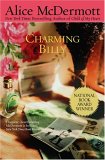Summary | Excerpt | Reading Guide | Reviews | Readalikes | Genres & Themes | Author Bio

You could not redeem Billy's life, redeem your own relentless affection for him, without saving at some point, "There was that girl."
"The Irish girl."
"Eva." Of course. Kate, his sister, would remember her name.
"That was a sad thing, wasn't it? That was a blow to him."
"A girl he met right after the war. Right after he came home. Out on Long Island."
"An Irish girl," Kate said, "visiting her sister, who was a nursemaid for some wealthy family from Park Avenue. He wanted to marry her, even gave her a ring. She had to go back home first, her parents were elderly, I think. But they wrote to each other. Billy was a great letter writer, wasn't he? He was always scribbling notes and mailing them off."
"He'd write a note on anything, wouldn't he? A paper napkin, a train schedule, and mail it off to you."
"I have one," Bridie from the old neighborhood said. She dug into her patent-leather purse and found a greeting-card-sized envelope with two stamps that showed a harp and a fiddle. She looked at the postmark--June 1975--and then extracted a limp paper square of a cocktail napkin that contained Billy's looping hand. "He sent it from Ireland," she said. "From Shannon Airport." And there was the Act Lingus logo in the corner. With a blue ballpoint Billy had written: "Birdie: Just saw your face pass by on a twelve-year-old girl in a navy-blue school uniform. Said her name was Fiona. She was meeting her father's plane from New York. Your smile, your eyes, your very face at that age--second edition. Love, Billy."
The napkin was ciculated, held as delicately as a fledgling, some even reaching into a purse or a breast pocket for reading glasses so as not to miss a word. All the way up the table to Maeve, who read it with a smile and a nod, and all the way back down again. Bridie took it back and read it once more before placing it into its envelope and back into a side, zippered compartment of her Sunday pocketbook.
Other letters from Billy were being mentioned: a note scribbled on a Playbill page, on a business card. The long missives he'd sent home during the war, whole lines blacked out by the censors but the homesickness coming through. He was so homesick. The postcards from the Irish trip, the place mats and napkins from various Long Island restaurants and diners, that summer he and Dennis were out there, fixing up Mr. Holtzman's little house. You remember Mr. Holtzman. Dennis's mother's second husband. The shoe-store man.
Which was the same summer he met the Irish girl. Eva. The one he had hoped to marry.
"She went back to Ireland at the beginning of the fall." Kate would remember. "And not long after that, Billy took the job with Mr. Holtzman--Saturdays all day and maybe Thursday nights, I think it was. Dennis had arranged it for him. Billy was trying to put together enough money to send for his girl, to bring her back here, and Dennis set it up with Mr. Holtzman that Billy work at the shoe store when he wasn't at Con Ed."
"He was a great salesman," her younger sister, also Rosemary, said.
"Well," Kate explained, "Mr. Holtzman had lost some business during the war--I don't know if it was rationing or his being of German extraction or what. Anyway, he was glad to get Billy, an ex-GI with that handsome face of his. Those blue eyes."
"He was a good-looking young guy," Bridie from the old neighborhood said. "Maybe a little shy."
"And that's where he met Maeve, wasn't it? In the shoe store?"
"Later on," Kate said. "She used to come to the store with her father, and I remember Billy telling me how patient she was with him because, you know, her father was a drinker, too."
"A redheaded W.C. Fields," sister Rosemary said. "I remember him at their wedding." Rolling her eyes.
From Charming Billy, by Alice McDermott. © 1997 by Alice McDermott, used by permission of the publisher Farrar Stead & Giroux
Your guide toexceptional books
BookBrowse seeks out and recommends the best in contemporary fiction and nonfiction—books that not only engage and entertain but also deepen our understanding of ourselves and the world around us.